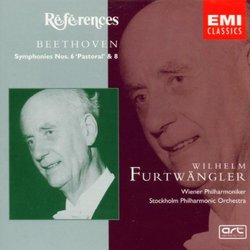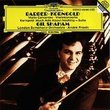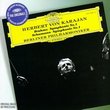| All Artists: Beethoven, Vpo, Shpo, Furtwangler Title: Symphonies 6 & 8 Members Wishing: 0 Total Copies: 0 Label: EMI Import Original Release Date: 1/1/1948 Re-Release Date: 1/9/2001 Album Type: Original recording remastered, Import Genre: Classical Styles: Historical Periods, Classical (c.1770-1830), Modern, 20th, & 21st Century, Symphonies Number of Discs: 1 SwapaCD Credits: 1 UPCs: 724356749320, 724356749351 |
Search - Beethoven, Vpo, Shpo :: Symphonies 6 & 8
 | Beethoven, Vpo, Shpo Symphonies 6 & 8 Genre: Classical
|
Larger Image |
CD DetailsSimilarly Requested CDs |
CD ReviewsFurtwangler was consistent in the Pastorale--this one is in Santa Fe Listener | Santa Fe, NM USA | 07/30/2006 (5 out of 5 stars) "Thanks to the resurgence of Furtwangler over the past two decades, we now have almost every recording he ever made, including dozens of live performances. In the case of the Pastorale Sym., the most prominent recordings are three: this 1952 studio account from Vienna, a wartime live performance (1844, on Music & Arts)) from Berlin, and another live Berlin performance from the year Furtwangler died (1954, on Tahra). Since all of them are now off copyright, I've given the record companies whose remastering seems the best. Furtwangler could be more heated and urgent in his wartime recordings, but the timings for the 1944 Berlin Sixth and this one are within a few seconds of each other; only the finale in Berlin is more than 30 sec. faster. What we hear is a measured pace in the first three movements, followed by a storm and finale that are taken at speeds normal today. Nothing sounds stodgy or hidebound, however, since Furtwangler kept a flowing pulse going at all times. I won't try to put into words the special magic of Furtwangler's style. If you are attuned, he holds you entranced from first to last. The two live readings are somewhat more immediate, which is comon for Furtwangler, who was no lover of the studio. To offset that, this 1952 recording is in excellent mono sound, far better than even the best restoration of the two radio broadcasts. So for many, this is a good place to start. The Eighth is not so fortunate technically. Furtwangler died without completing a full Beethoven cycle, and EMI had to resort to a hissy shellac aircheck from Stockholm, 1948. Despite the hiss and surface gritch, the sound is quite listenable (it's like listening over a table radio), and we are rewarded with a vibrant reading that, to tell the truth, exceeds the famous Pastorale." Furtwangler conducts Beethoven Hiram Gomez Pardo | Valencia, Venezuela | 04/20/2006 (5 out of 5 stars) "Every time you listen this brilliant genius conducting his favorite composer (according the impressive average, of play Beethoven at least one of each two Concerts) , you may feel F?rtwangler' s engaging spell in what concerns to illuminate the score, for instance, has no parallel in the music.
This Pastoral remains as one of the most examples of cosmic rapture, of perpetual commitment absolutely out oh this world, inscribed in the mythic roots and the deeper significance of Beethoven `s music. "To Beethoven the creative effort goes from the chaos to the clarity. In him, the Dionysian ecstasy and the Apollonian harmony are intimately linked. His music remains among us as an example of balance between the language of the sound and the language of the soul, between the musical architecture and the development of a tragedy, whose roots are in the psyche and mainly between the "myself" and the rest of the Humanity; between the isolated individual and the community. In spite of the limited space, he achieved in a sonata what Aristotle in a tragedy; to exalt the soul through the catastrophe." So when you read and assimilate these clear and wisdom statements about Beethoven is easy to understand why F?rtwangler `s Beethoven certainly lives in a superior level. Nowadays, pitifully the frenetic activity of most Conductors simply do no tallow them to express their ideas, but according to the obtained results since the last thirty years the balance is dangerously negative. " |

 Track Listings (9) - Disc #1
Track Listings (9) - Disc #1
